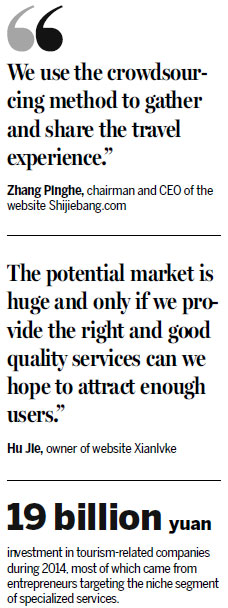Niche offerings
Shijiebang.com, another online travel agency, was set up in 2012 and aims to provide tailor-made travel package for users by sharing the travel experiences.
"We use the crowdsourcing method to gather and share the travel experience," said Zhang Pinghe, chairman and CEO of the website. About 2,000 to 3,000 experienced helpers from all over the world are registered on Shijiebang.com and it already has about 4 million users currently.
Like Xianlvke, Shijiebang's helpers are also experienced local residents in Europe, the US as well as Australia and their thorough knowledge about the spots are rewarding for travelers.

Citing an example, Zhang said, he prefers to live in a hotel with a convenience store nearby when he travels, but most of the traditional travel agencies or tourism guidebooks do not provide this information.
"In this case, we need local residents with rich travel experience for consultations," Zhang said.
Like Xianlvke, Shijiebang helpers also answer the travelers' questions online and make specific plans for them, but they usually do not meet them in person.
The helpers get paid by Shijiebang according to the services provided. The travelers only pay for the travel package, including hotel, air tickets and other products, rather than for the consultancy service. "The consulting service could be sold, but not for now," Zhang said.
The company plans to charge maybe 10 percent of the whole package cost as consulting fees in the future, Zhang said.
"We need to spend time to spruce up our services and reduce consumer complaints before we can start charging for services," he said.
Even as companies like Xianlvke and Shijiebang are expanding their tourism products, other are deepening their existing products.
Zanadu, an online travel agency that focuses on boutique and luxury hotel booking, is planning to use the surge in outbound tourists to offer fresh and unique travel experiences.
"Zanadu's goal is to bring unique experiences to Chinese travelers," said Wang Yang, chief operating officer of the company.
The company is clear about its target consumers, most of whom are urban elites and sophisticated travelers, Wang said, adding that most of them live in first- and second-tier cities and are frequent overseas travelers.
Total spending by Chinese outbound tourists stood at $140 billion in 2014, an 8 percent year-on-year growth, according to data provided by the China Tourism Academy.
For companies like Zanadu, however, it is not the consumer that is the problem. Instead, its concern is more about resources as its target hotels are all luxury and boutique ones.
In order to reach out to its target hotels, Zanadu seeks partnership with boutique hotel associations and also participates in major industry events, Wang said.
Since the website is relatively well-known within the high-end travel industry, some hotels come to Zanadu directly, he said, as the website is also a channel for the unknown hotels to market their products in China.
Zanadu has already made a profit in 2014 from hotel bookings, sales of travel products and packages as well as advertising, although making profit is not its only goal at present, Wang said.
Even as companies scramble to provide the right kind of services to attract outbound tourists, industry sources said most of the issues are often those related to service information and local guides.
The market potential for niche services is huge considering that the total number of trips made by Chinese tourists exceeded 100 million person-trips last year, experts said.
"Bright prospects exist for niche tourism-related companies," said Wei Changren, general manager and chief analyst of CTCNN.
Customer retention
More Chinese travelers will choose the self-guided way to travel abroad, Wei said, and they will also need specialized services ranging from hotel bookings to scenic spot tickets.
However, such enterprises should also develop only at a reasonable speed rather than expanding rapidly, the sources said.
"Retaining market share is important for all online travel agencies, but it also needs huge investments," Wei said.
Several online travel agencies have already spent huge amounts and made considerable efforts to retain customers.
The sales and marketing costs of Ctrip, China's largest online travel agency in terms of market share, was about $97 million in the third quarter of 2014, a 25 percent year-on-year growth.
Smaller companies, who do not have so much of capital, will need to spend more time to grow customers and to provide unique services, the sources said.
On the other hand, the existing enterprises should try to enlarge their products to get more business once they have achieved a reasonable scale.
After two years of development, Shijiebang is now coming out with some standardized tourism products, based on its user preferences.
"We use the popular items among users to develop standardized products, as it helps save human resource costs," said Zhang from Shijiebang.
Online travel agencies must explore various options to retain existing users, said Wei from CTCNN.
Tourism products are not items of daily consumption, he said adding that it is not uncommon also for Chinese residents to visit overseas destinations. "The only difference is that the usage levels are relatively low. If online agencies do not offer multiple choices, customers will go to those who do so, Wei said.
"The niche market is a good start, but in order to cut costs and get more users, the enterprises still need to continue expanding," he said.
